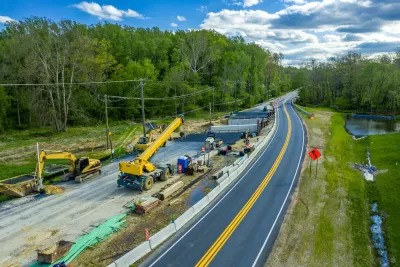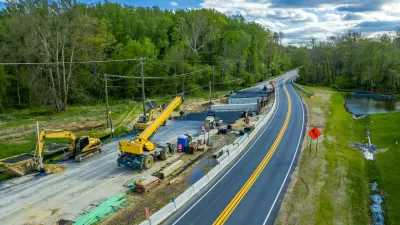U.S. transportation policy, which still heavily centers automobile infrastructure, is increasingly out of step with the majority opinion, according to a new survey from Transportation for America.

A new survey from Transportation for America (T4A) reveals that a vast majority of American voters don’t think expanding roads and highways is the best way to solve traffic congestion, according to a T4A blog.
In fact, 36 percent of the 2,001 respondents—90 percent of whom own cars—said expanded roadways would bring more traffic. “Only 11 percent felt state DOTs actually deliver congestion relief with highway expansions. In other words, the public understands the concept of ‘induced demand,’ which is widely ignored by state legislatures, DOTs, Congress, and federal agencies.”
Survey respondents expressed “a deep dissatisfaction with the overall status quo of state and local transportation spending which overwhelmingly prioritizes spending on new roads, often at the expense of keeping roads and bridges in good condition, investing in transit and safe streets for walking or biking, or reducing the need to drive overall.” The most popular option for how states should spend transportation funding was the repair and maintenance of existing infrastructure.
The blog points out that results indicate a massive gap between policymaking that continues to privilege road building and public opinion about transportation policy.

Maui's Vacation Rental Debate Turns Ugly
Verbal attacks, misinformation campaigns and fistfights plague a high-stakes debate to convert thousands of vacation rentals into long-term housing.

Planetizen Federal Action Tracker
A weekly monitor of how Trump’s orders and actions are impacting planners and planning in America.

In Urban Planning, AI Prompting Could be the New Design Thinking
Creativity has long been key to great urban design. What if we see AI as our new creative partner?

Pedestrian Deaths Drop, Remain Twice as High as in 2009
Fatalities declined by 4 percent in 2024, but the U.S. is still nowhere close to ‘Vision Zero.’

King County Supportive Housing Program Offers Hope for Unhoused Residents
The county is taking a ‘Housing First’ approach that prioritizes getting people into housing, then offering wraparound supportive services.

Researchers Use AI to Get Clearer Picture of US Housing
Analysts are using artificial intelligence to supercharge their research by allowing them to comb through data faster. Though these AI tools can be error prone, they save time and housing researchers are optimistic about the future.
Urban Design for Planners 1: Software Tools
This six-course series explores essential urban design concepts using open source software and equips planners with the tools they need to participate fully in the urban design process.
Planning for Universal Design
Learn the tools for implementing Universal Design in planning regulations.
planning NEXT
Appalachian Highlands Housing Partners
Mpact (founded as Rail~Volution)
City of Camden Redevelopment Agency
City of Astoria
City of Portland
City of Laramie





























